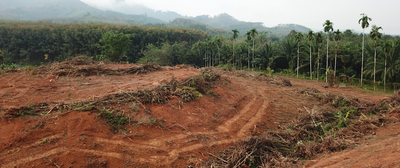
Buying Myanmar timber a potential ‘war crime’, says report
Amid all the news reports and debates about oil and gas as an economic lifeline for the junta, one of Myanmar’s most precious natural resources has been overlooked: its forests. Millions of people depend on them for their livelihoods and wellbeing, and they provide a sanctuary for globally threatened wildlife.
Myanmar’s previous military junta, which took power after a nationwide uprising in 1988, handed out sweeping logging concessions to provide the military with the cash to expand and consolidate control over the country. The current junta, grappling with international isolation and an economic crisis largely of its own making, is also encouraging the timber trade among other forms of natural resource exploitation. Last year, the junta-controlled Ministry of Natural Resources and Environmental Conservation cited the need to meet revenue targets for timber (in particular, teak) which it said “must continue to play an important role in bringing income to Myanmar”.
Although timber has accounted for a far smaller proportion of Myanmar’s export earnings than oil and gas in recent decades, the toll inflicted by the timber trade has been much more grave. Between 2001 and 2020, Myanmar lost four million hectares of its tree cover, a 9.3 percent decrease that has shattered ecosystems across the country.
Last year, several countries, including the United States, and the European Union sanctioned the Myanmar Timber Enterprise (MTE). Since the state-owned enterprise has a formal monopoly on the trade in Myanmar, these sanctions are de facto bans on importing timber from the country. This may have contributed to the relative lack of interest recently in timber as a revenue source for the regime, particularly given that the Myanmar Oil and Gas Enterprise remained un-sanctioned until February this year.
However, as a report published this month by US non-profit Forest Trends shows, it’s one thing to impose sanctions and another to get traders to stick to them. Based on trade data from importing countries, the report says US$37 million worth of Myanmar timber (most of it teak) entered markets where sanctions were in place between February 2021, when the coup happened, and November of that same year.
This trade includes $22 million of timber into the EU, which sanctioned the MTE on 1 June last year; $14 million into the US, which did so several months earlier, on 21 April; $0.5 million into Canada, which sanctioned the MTE on 14 May; and $0.1 million into Switzerland, which did so on 1 July. All these markets have also sanctioned military conglomerate Myanmar Economic Corporation, whose port of Ahlone in Yangon handles much of Myanmar’s timber exports.
One of the most common uses of Myanmar teak in these markets is in the building of luxury yachts. These vessels are of the type being seized in several countries for belonging to sanctioned Russian oligarchs, following the outbreak of war in Ukraine.
While the MTE held several teak auctions over the last year, the declared income of $8.1 million is far below the sums reported by foreign customs agencies, and none of the auctions were reportedly for export-grade teak. This leaves the exact origin of the exported teak a mystery; a separate report by activist group Justice for Myanmar said that American importers were trading via intermediary companies.
The MTE’s figures have never added up; since 2014, the top five importing countries reported $2 billion more than Myanmar reported in exports, the Forest Trends report describes. This discrepancy indicates rampant smuggling, which has coexisted alongside direct sales by the MTE to military-linked companies at well below market rates, as well as the apparent laundering of unreported, and therefore illegal, timber. The resulting losses to the state have helped to line private pockets, and although measures were introduced over the last decade to curb corruption and smuggling, these protections risk being unwound by the junta at the stroke of a pen. Buying Myanmar teak therefore not only provides the junta with precious foreign exchange through its control of MTE, but also risks contributing to corruption and the enrichment of a military-linked elite.
While the proper enforcement of existing sanctions would potentially deprive the junta of tens of millions of dollars, the countries with sanctions regimes accounted for only 19 percent of Myanmar’s timber exports between February and November 2021, which totalled $154 million. China alone imported $92 million worth of timber during this time and India $33 million, and neither country has imposed any sanctions on the regime.
Nonetheless, the Forest Trends report says US sanctions could in theory apply to any company or individual transacting with the MTE, regardless of nationality, because all international payments to it are in US dollars. The US has previously penalised companies in distant countries for using its currency to pay sanctioned entities, for instance in the case of Singapore-based CSE TransTel Pte. Ltd, which in 2017 reached a settlement with the US worth $12 million because it paid dollars to Iranian businesses.
The Forest Trends report adds that people from anywhere in the world who continue to do business with the MTE face an even graver threat. Because Myanmar’s timber could be considered “stolen property” and is being harvested amid an armed conflict, anyone who buys timber from the MTE could be guilty of the international war crime of “pillage”. Perpetrators of war crimes such as pillage, whatever their nationality, can be prosecuted by any court in the world under the principle of universal jurisdiction.
There is also no statute of limitations on such crimes, meaning perpetrators run the risk of being prosecuted for the rest of their lives. If that doesn’t give pause to any would-be trader in Myanmar’s teak, it’s unclear what will.
Image: Stock Photography / Shutterstock



